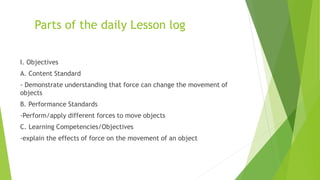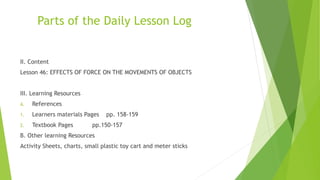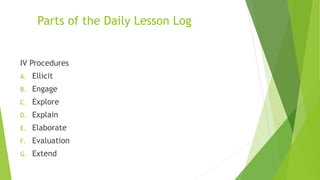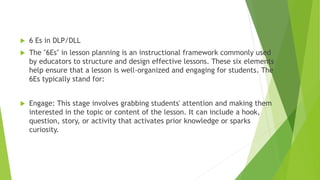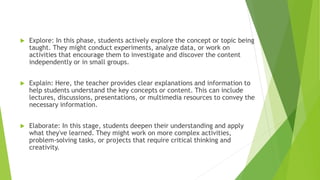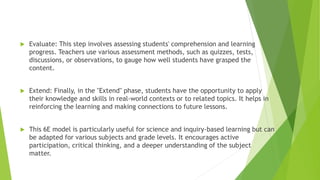PPT-SCI-55-DLL-PARTS.pptx
- 1. Parts of the daily Lesson log I. Objectives A. Content Standard - Demonstrate understanding that force can change the movement of objects B. Performance Standards -Perform/apply different forces to move objects C. Learning Competencies/Objectives -explain the effects of force on the movement of an object
- 2. Parts of the Daily Lesson Log II. Content Lesson 46: EFFECTS OF FORCE ON THE MOVEMENTS OF OBJECTS III. Learning Resources A. References 1. Learners materials Pages pp. 158-159 2. Textbook Pages pp.150-157 B. Other learning Resources Activity Sheets, charts, small plastic toy cart and meter sticks
- 3. Parts of the Daily Lesson Log IV Procedures A. Ellicit B. Engage C. Explore D. Explain E. Elaborate F. Evaluation G. Extend
- 4. ïĩ V. Remarks ïĩ VI. Reflection
- 5. ïĩ 6 Es in DLP/DLL ïĩ The "6Es" in lesson planning is an instructional framework commonly used by educators to structure and design effective lessons. These six elements help ensure that a lesson is well-organized and engaging for students. The 6Es typically stand for: ïĩ Engage: This stage involves grabbing students' attention and making them interested in the topic or content of the lesson. It can include a hook, question, story, or activity that activates prior knowledge or sparks curiosity.
- 6. ïĩ Explore: In this phase, students actively explore the concept or topic being taught. They might conduct experiments, analyze data, or work on activities that encourage them to investigate and discover the content independently or in small groups. ïĩ Explain: Here, the teacher provides clear explanations and information to help students understand the key concepts or content. This can include lectures, discussions, presentations, or multimedia resources to convey the necessary information. ïĩ Elaborate: In this stage, students deepen their understanding and apply what they've learned. They might work on more complex activities, problem-solving tasks, or projects that require critical thinking and creativity.
- 7. ïĩ Evaluate: This step involves assessing students' comprehension and learning progress. Teachers use various assessment methods, such as quizzes, tests, discussions, or observations, to gauge how well students have grasped the content. ïĩ Extend: Finally, in the "Extend" phase, students have the opportunity to apply their knowledge and skills in real-world contexts or to related topics. It helps in reinforcing the learning and making connections to future lessons. ïĩ This 6E model is particularly useful for science and inquiry-based learning but can be adapted for various subjects and grade levels. It encourages active participation, critical thinking, and a deeper understanding of the subject matter.
